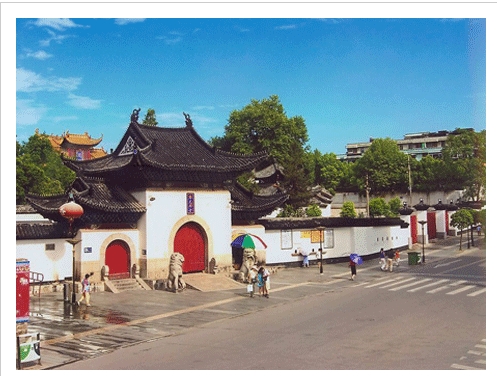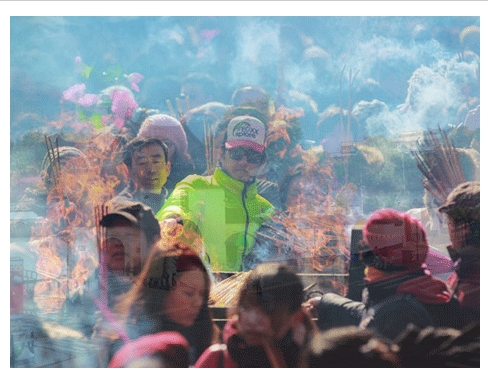
Tens of thousands of people go to pray and burn incense at Yonghe Lama Temple in Beijing during Lantern Festival, which fell on Monday this year.

China Mobile, monks offer text-messaged prayers for fee.
WUHAN - A famous Buddhist temple in Wuhan, capital of Hubei province, encourages people to send text messages rather than burn incense to say their prayers.
"This go-green initiative is the first of its kind among Buddhist temples in China. It helps reduce the size of crowds during peak seasons and lowers the risk of stampedes and fires," said Han Xue, a lay Buddhist who works at Guiyuan Temple in Wuhan, which has hundreds of thousands of visitors during Spring Festival.
Guiyuan Temple, built in 1658, is in an urban part of Hanyang district surrounded by residential blocks.
In the past two weeks, the crowds of visitors grew, peaking at 360,000 on Jan 27, the fifth day of the first month in China's lunar calendar, celebrated as the birthday of the God of Fortune, when people traditionally worship at temples and pray.
In 2010 during that celebration, 600,000 people went to the temple, and Wuhan authorities dispatched 4,000 police officers in case of fires, stampedes and traffic jams.
This year, although the ticket price had doubled from 10 yuan ($1.60) a person to 20 yuan during Spring Festival, masses of visitors kept pouring in.
Li Xiaobo, 31, came with his wife from Guizhou province to see relatives in Jingzhou, a city in Hubei about 220 km from Wuhan. They heard of Guiyuan Temple and wanted to see it for themselves.
The temple, in cooperation with the Hubei branch of China Mobile, a leading Chinese telecom operator, offers a service of blessings sent by text messaging.
A message with eight or fewer characters costs 3 yuan, and longer ones of up to 20 characters cost 10 yuan. Normally, text messages cost no more than 0.15 yuan.
The sender writes the text of the blessing and includes the cell phone number of the receiver. China Mobile forwards the blessing to the receiver.
From 8 am to 5 pm, the messages are shown on an LED board at the southwest corner of the temple. Monks later chant prayers for the senders and receivers.
More than 30,000 people have already tried the service - they have to be China Mobile subscribers with phone numbers in Hubei province.
Yang Guo, an employee at the Hubei branch of China Mobile who oversees the service, said more than 1,000 text messages were sent each day in the past two weeks, adding that the service will remain available after Spring Festival.
Yang Meiqin, 49, a business owner in Wuhan, received a blessing message from a friend. She liked the idea and went to the temple to learn how it works.
Chen Meng, 37, another Wuhan businesswoman, got a similar blessing from a friend who visited the temple on Friday.
Chen was moved by the gesture and said it showed religious circles are trying to stay in pace with modern China and appeal to younger generations.
But Li Jian, 28, who works at a design office in Wuhan, disapproves, saying the service taints the purity of Buddhism and detracts from the prayer, making it an impious act.
Zhang Tongyou, 63, a Beijing resident and Buddhist for more than 20 years, said temples should not charge money for displaying text messages.
"Other temples can do the same, free of charge, if it helps reduce the crowds during peak seasons," Zhang said.
Wei Chi, a lay Buddhist who works at Famen Temple, Fufeng county, 120 km west of Xi'an, capital of Northwest China's Shaanxi province, said temples should not seek to profit from people sending prayer messages.
According to Wei, nearly 60,000 people came to Famen Temple on Jan 23, Lunar New Year's Day. On that alone, visitors did not have to pay to enter. The rest of the year, tickets cost 120 yuan apiece.
The old Famen Temple could not have handled such a crowd. But after an expansion completed in May 2008, with investment from a company under the government of the Qujiang New Area of Xi'an, a square in the new Buddhism-themed tourist zone can hold 400,000 people, Wei said.
Lingyin Temple in Hangzhou, capital of East China's Zhejiang province, can also handle huge crowds during holidays, according to a temple employee who declined to identify himself.
"Temples can decide for themselves whether they have the technical and financial resources to spread prayer and blessings by text messaging, and whether to charge for the service or offer it free.
"Lingyin Temple has the experience to manage the crowds and doesn't need to keep people at home sending text messages," he said.
Source: China Daily





